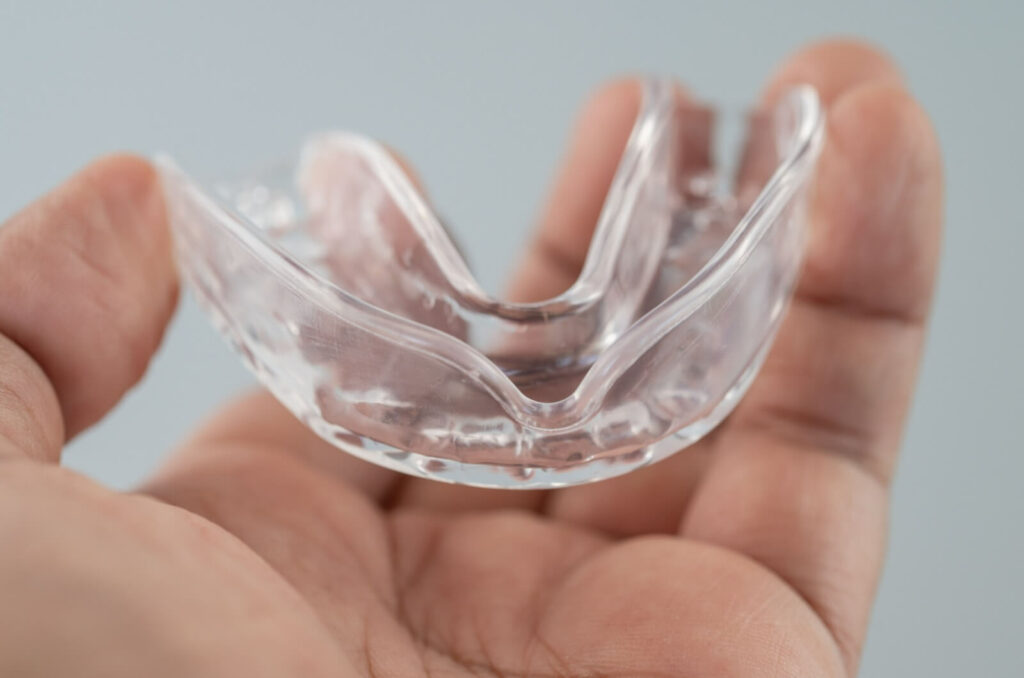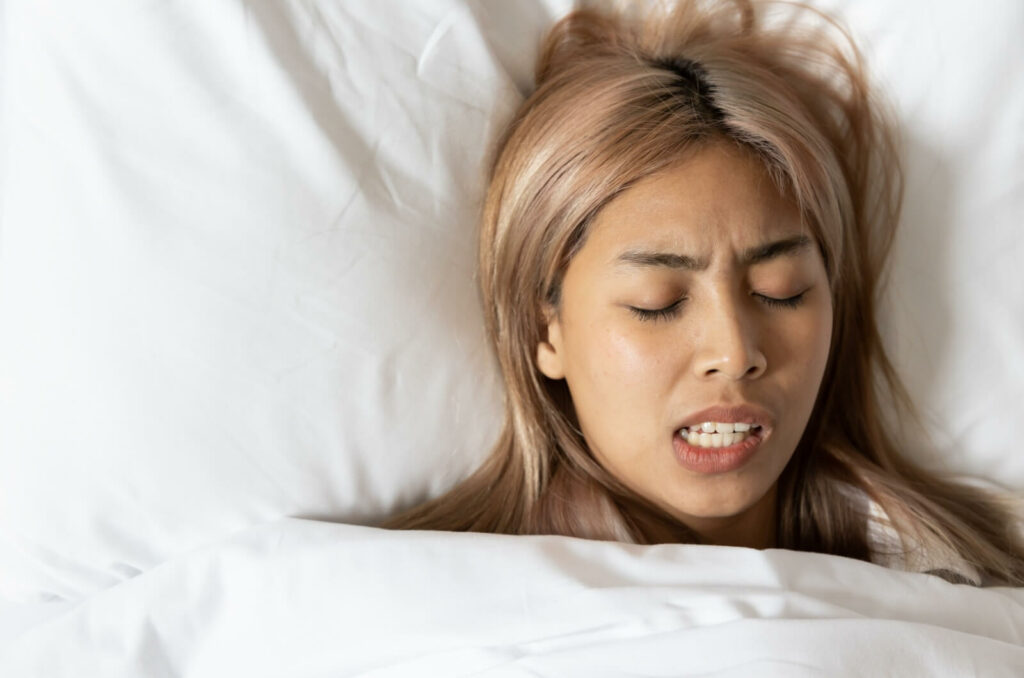When stress or anxiety becomes part of daily life, many people unknowingly respond by clenching their jaws or grinding their teeth.
Teeth grinding, or bruxism, can lead to a range of issues, with tension headaches being one of the most common. And factors other than stress, such as bite misalignment, can contribute to teeth grinding.
Fortunately, teeth grinding can be effectively managed with:
- A custom mouth guard or splint
- Dental adjustments and clear aligners
- Certain lifestyle changes
What Is Bruxism?
Often occurring during sleep, bruxism can go unnoticed until symptoms like headaches present themselves. The repetitive clenching and grinding of teeth create significant pressure on the jaw muscles, leading to discomfort and even headaches.
Teeth grinding can happen in the day, too, although nighttime grinding may be more challenging to manage since you’re unaware.
Several factors can cause teeth grinding, such as:
- Stress and anxiety
- Teeth misalignment
- Abnormal bites
- Certain medications
- Caffeine consumption
- Alcohol use and smoking
Consistent jaw tension left untreated can exacerbate the problem. Excessive bruxism can lead to tension headaches, causing a dull ache or tightness around the forehead and temples and contributing to overall discomfort.
Identifying symptoms of bruxism can help you detect it early and seek early intervention to prevent long-term damage. Common symptoms include:
- Frequent tension headaches, especially upon waking
- Persistent discomfort or soreness in the jaw muscles
- Visible wear on enamel or chipping on teeth surfaces
- Pain without an infection, which is often linked to jaw strain
- Grinding noises that can disturb your sleep or your partner’s
Teeth Grinding & Its Effects on Oral Health
Teeth grinding is more than just a bad habit, and it can cause more than just headaches. Ignoring bruxism can lead to serious complications affecting oral health and overall well-being. Occasional teeth grinding might seem innocuous, but chronic bruxism can significantly impact oral health.
One of its most immediate effects is the wearing down of tooth enamel. As this protective outer layer wears away, teeth become more sensitive and susceptible to cavities, making them vulnerable to further damage.
Chronic bruxism can often cause cracked or chipped teeth, requiring restorative or cosmetic dental procedures like crowns or veneers to repair the damage. The continuous pressure can strain the temporomandibular joint (TMJ), causing pain and dysfunction that can affect chewing and speaking.
Long-term bruxism can also impact gum health. The constant force exerted during grinding can contribute to gum recession, exposing the roots of the teeth and increasing the risk of periodontal disease.

Bruxism Treatment Options
Several options can help treat teeth grinding, and your dentist can find a treatment that’s most suitable for your needs. They will examine the health of your jaws and teeth to determine the severity of the grinding to develop a personalized treatment plan.
Custom Nightguards
One of the most common treatments for nighttime bruxism is using a custom nightguard—a mouth guard or splint meant to be worn overnight.
Designed to fit snugly over the teeth, nightguards provide a barrier to prevent grinding during sleep. By reducing the direct contact between upper and lower teeth, mouth guards help alleviate the pressure on the jaw muscles and protect the enamel from wear.
While over-the-counter mouth guards are available, custom-made mouth guards are the preferred option as they can be tailored for comfort and effectiveness.
To reap the full benefits of wearing a nightguard, it’s helpful to:
- Choose the thinnest possible mouth guard to obtain the most comfort while you sleep
- Consistently wear your nightguard to help reduce the frequency and severity of grinding, leading to fewer tension headaches and jaw pain.
- Only wear your customized nightguard while you sleep, and don’t use it for other purposes.
Dental Adjustments & Clear Aligners
Misaligned teeth or an abnormal bite may be the underlying cause of teeth grinding for some individuals. In this case, dental adjustments or orthodontic treatment provides long-term relief.
Dental treatments may include reshaping the biting surfaces of teeth to eliminate irregular contact points and improve alignment.
Orthodontic treatment, like clear aligners, can correct bite concerns and enhance overall jaw function. By aligning teeth properly, unnecessary pressure on jaw muscles is reduced, minimizing the effects of teeth grinding and its associated symptoms.
In more severe cases, dentists may suggest full-mouth reconstruction as a comprehensive approach to realigning teeth and jaws. This may involve a combination of orthodontics, crowns, and other restorations to achieve ideal results.
Lifestyle Modifications
Since stress is a major contributor to bruxism, implementing stress management techniques can be highly effective in reducing teeth grinding in addition to professional treatments.
Relaxation exercises, such as deep breathing, meditation, and yoga, can help lower stress levels and promote a sense of calm, reducing the likelihood of clenching and grinding.
Lifestyle modifications and self-care practices can also play a significant role in managing teeth grinding. Practicing good sleeping habits, such as maintaining a consistent sleep schedule and creating a relaxing bedtime routine, can promote restful sleep and reduce the likelihood of grinding.
Avoiding stimulating substances, such as caffeine and nicotine, is also beneficial, as these can exacerbate bruxism. Instead, choose calming herbal teas or warm milk before bed to promote relaxation.
Schedule a Visit
Visiting your dentist is the first step to finding long-term relief from teeth grinding. They’ll be able to determine the underlying cause of this condition, assess the severity of the grinding, and develop a treatment plan tailored to your needs.
Connect with our team at Upper Gage Dental Center to schedule an appointment.



